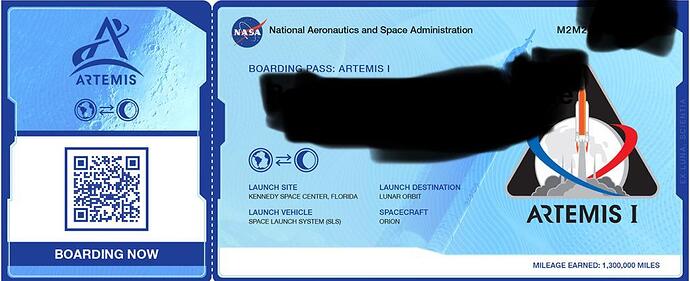Thank you, @Donkeyman
https://www.nasa.gov/feature/artemis-i-mission-availability
September 19 – October 4
14 launch opportunities
No launch availability on Sept. 29 and Sept. 30
October 17 – October 31
11 launch opportunities
No launch availability on October 24, 25, 26, and 28
November 12 – November 27 (preliminary)
12 launch opportunities
No launch availability on November 20, 21, and 26
December 9 – December 23 (preliminary)
11 launch opportunities
No launch availability on December 10, 14, 18, and 23
Thanks@Dextrous63
Shaun the sheep, hope he is not sleepless in space.
I recall I sent my name up into the stars 
Did you? I love this idea! Have you got an actual star, or is your name just randomly floating around on a bit of lined paper? 
Ooooooooh! This is amazing! So cool! 
I hope that there are no space scammers downloading that information…
.
Had to laugh - “propellant slosh” just rolls off the tongue doesn’t it?
Prop slosh a new phrase for urban dictionary.
Mixed feelings about this, fascinated by the technology, fearful of the consequences.
It beggars belief that humans would be able to survive decelerating from 25000mph to 350mph ish, over a few short minutes!
The heat shield and spacesuits must be designed to cope with that.
If you rolled off a 4 foot wall, it’d take you about 0.5 seconds and you’d hit the ground at about 11mph, and it would hurt and you’d probably do yourself some serious injury.
Not planning on trying it any time soon. 
Re-entry trajectories are carefully calculated to make sure that both the spacecraft and the crew are never exposed to forces beyond what they can tolerate so that when they do touch down, they do so fully intact.
Just watched Apollo 13 on TV. Did a few calculations and it’s mind boggling. Before entering the atmosphere, they were travelling at around 6.5 miles per second. That’s per second!!! After a few short minutes, they splashed down at around 20mph. Absolutely insane rate of deceleration!!
Not knowing if the heat shield was damaged must have seemed an eternal few minutes. They have to land where expected for recovery.

